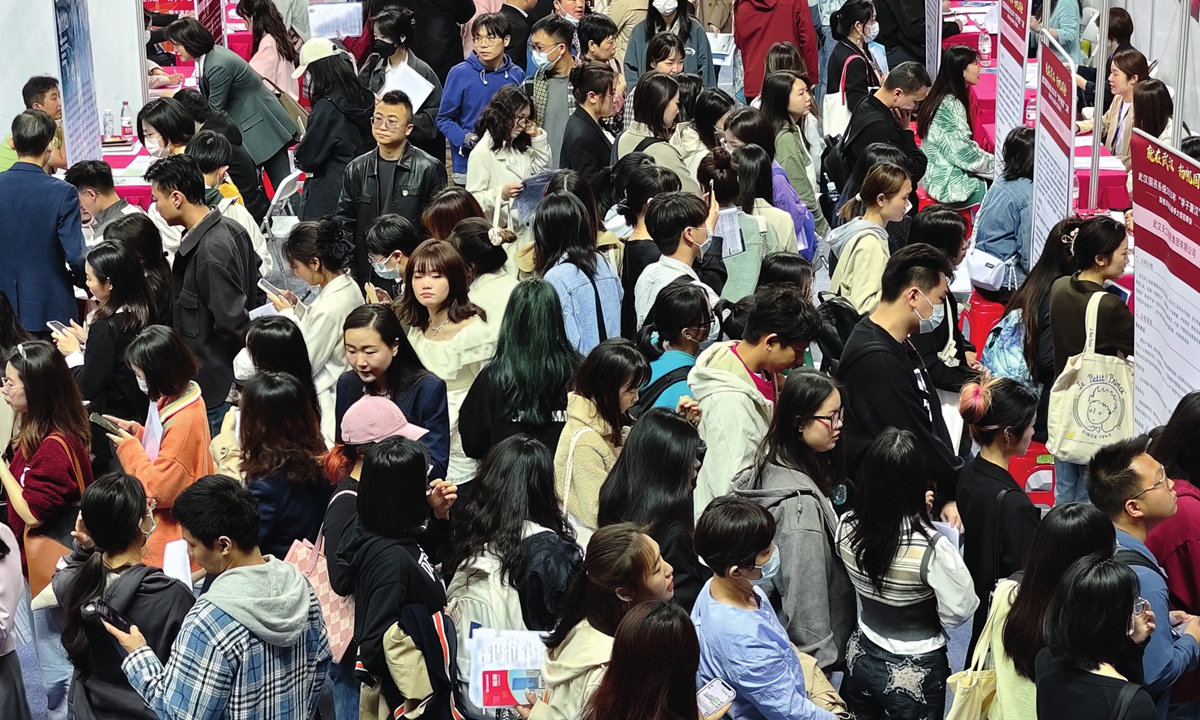'Taking off Kong Yiji's robe': dim job prospects or exploring possibilities in changing job market

College students attend a job fair at Beijing Union University on April 28, 2023.Photo: VCG
In the eyes of most people, Michelle Cheng's job in a Chongqing public hospital office would be an "iron rice bowl" that many would like to have. It has regular work hours, guaranteed salary, and low risk of being fired.
However, Michelle dropped the bowl earlier April.
Now she works as a tour guide for elderly tourists. Although the salary is about the same, Michelle now has to work about twice as long as before every day. She has to wake up at around 6 am to pick up her clients and goes back home normally after 9 pm, "feeling as though my body is weighted with lead," said Michelle. "Even during my days off, I have to keep an eye on my phone, so I won't miss calls from potential clients."
But despite the physical fatigue, Michelle said her new job has unleashed the real her, after feeling trapped in her tedious "iron rice bowl" job. "I was a walking dead in the hospital office. Everyday I organized documents, listening to the old ladies' gossip, and waiting to be off the clock."
Now Michelle gets to meet different types of people every day. "One day I guided a tour group of retired soldiers. They told me about their experiences. The other day my tour group was several retired scientists. I feel each day I live a new life because of my clients," she said.
Michelle said her mother was "devastated" when she heard her daughter gave up the hospital job to be a tour guide. "But I told my mother, there is not only one way to live my life."
Michelle is not an unusual case. It is becoming trendy among Chinese youngsters to escape "shiny jobs in skyscrapers" and switch to other more ordinary jobs. There's also a popular saying that they are taking off "Kong Yiji's robe," a term inspired by modern Chinese literature and used to refer to college graduates who consider themselves above manual labor.
Hashtags such as "young people escape office building to embrace labor work," and "why an increasing number of young people chose labor" have become trendy on China's Twitter-like platform Sina Weibo.

Young job-seekers crowd a labor market at Wuhan Jianghan University on April 23, 2023. Photo: VCG
Endless possibilities
A lot of young people have vented their frustration about the currently dim job market, with many coming to realize that academic qualifications no longer guarantee a satisfactory job, Zhang Yiwu, a professor on Chinese language and literature at Peking University, told the Global Times.
Unemployment has risen to 19.6 percent among 16-24 year-olds, according to figures released by the National Bureau of Statistics last week. In 2023, 11.58 million students graduated from university, and this marks the first year that doctorate and postgraduate students have surpassed the number of undergraduate students.
However, officials believe that the job market is improving. The urban unemployment rate dropped to 5.3 percent in March, down from 5.6 percent in February, and the number of new jobs stood at 2.97 million, Lu Aihong, spokesperson for the Ministry of Human Resources and Social Security, said on Monday.
When analyzing the "Kong Yiji" phenomenon, Yao Yang, a professor with the National School of Development at Peking University wrote an article saying that the majority of young Chinese people have received higher education, but there is a shortage of staff in labor-intensive industries. So some fresh graduates may feel their salaries pale in comparison with those of blue collar workers, and they got frustrated, said Yao.
Under such circumstances, some young people are swaying away from cutthroat white collar job competition. People such as a former journalist who became a deliveryman and an office worker who started selling sausages on the street have won applause online for their courage and endeavor.
Zhang said that another reason for young people to turn away from office work is that the job market is becoming more diverse in China. "This generation of youth in China is the best educated, and more widely connected with the outside world, so they are more likely to overthrow occupational stereotypes. Moreover, their families are much better off than their parents' families, so they have support for their free choices and adventures," said Zhang.
According to media data agency TOPKLOUT, there are some emerging occupations among young people, such as those who cook for people in their houses, taking patients to doctors and helping to feed pets when the owners are absent.
Thirty-two-year-old Daniel Qin used to work in an Internet company, an industry that is famous for its high salaries but also its heavy work load. "I worked and worked but I felt no sense of achievement. I was just like a cog in a big machine," said Daniel.
After he quit the job, Daniel began to work in a museum helping to curate exhibits. Being an art fan, he said his current job is more fulfilling. "Not only can I experience art on a daily basis, I can also see the artworks I helped curate being appreciated by visitors."
Although the salary is only about one-third of what the internet company paid, Daniel said his decision has been worth it. "I think being well educated should not trap me in a job that I don't like; it is about enabling me to embrace endless possibilities in life."

